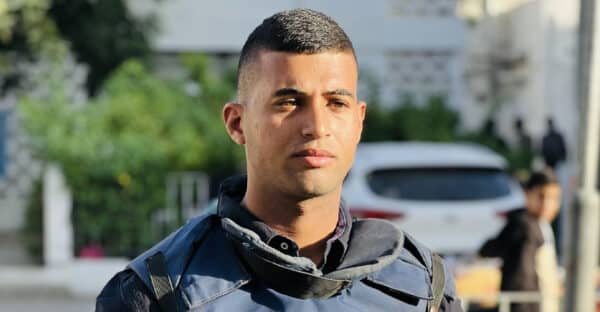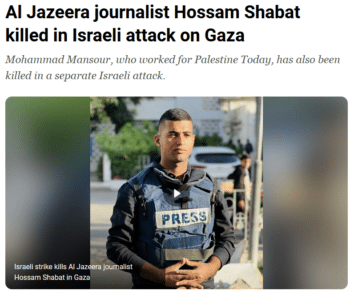
Hossam Shabat (Al Jazeera, 3/24/25): ““If you’re reading this, it means I have been killed—most likely targeted—by the Israeli occupation forces.”
The Israeli military killed Hossam Shabat, a 23-year-old Palestinian journalist and correspondent for Al Jazeera and Drop Site News, on Monday, March 24. The deadly targeting of Shabat’s vehicle in the northern Gaza Strip was in fact Israel’s second journalist assassination for the day; hours earlier, Palestine Today reporter Mohammad Mansour was killed in an Israeli strike on his home in southern Gaza.
And yet it was all in a day’s work for Israel, which according to the Committee to Protect Journalists (CPJ) has now killed at least 170 Palestinian journalists and media workers since October 7, 2023, when Israel’s armed forces kicked off an all-out genocide in the besieged enclave. According to Gaza’s Government Media Office, the number of fatalities is actually 208.
No doubt many journalists would be expected to perish in an onslaught as indiscriminate and massive as Israel’s in Gaza, where in February the death toll for the past 16 months was raised to nearly 62,000 to account for the thousands of Palestinians presumed to be dead beneath the rubble. Shockingly, that’s one out of every 35 Gaza residents—but for Gaza journalists, the International Federation of Journalists estimates that Israel has killed one out of every ten.
In Shabat’s case, as in numerous others, Israel does not even pretend the assassination was an accident, but rather it attempts to frame Palestinian journalists as terrorists. Indeed, targeting journalists appears to be part of Israel’s efforts—which also include preventing foreign journalists from entering Gaza—to prevent documentation of its atrocities.
Meanwhile, in the face of such egregious assaults on the press, U.S. media remain shamefully silent.
‘He bore witness’
In October 2024, one year into the extermination campaign, Israel accused Shabat and five other Gaza journalists with Al Jazeera—where I myself am an opinion columnist—of being militants in the service of Hamas and Islamic Jihad. CPJ, which has repeatedly excoriated Israel for “accusing journalists of being terrorists without producing credible evidence to substantiate their claims,” condemned the accusations as a “smear campaign” that endangered the lives of journalists.
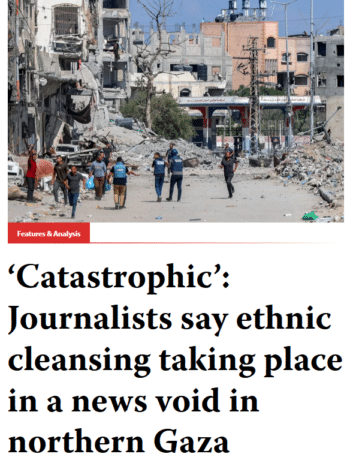
Hossam Shabat (CPJ, 11/8/24): “Our only crime is that we convey the image and the truth.”
Yesterday, the Israeli army took to the platform X to celebrate the fact that it had “eliminated” Shabat, offering the charming obituary: “Don’t let the press vest confuse you, Hossam was a terrorist.” This from the people who just killed 200 Palestinian children in a matter of days.
Responding to the initial terror allegation last year, Shabat remarked to CPJ: “Our only crime is that we convey the image and the truth.” And convey the truth he did. As Egyptian-American journalist Sharif Abdel Kouddous, who translated Shabat’s last article for U.S. outlet Drop Site News just after he was killed, wrote in the preface to the translation:
He bore witness to untold death and suffering on an almost daily basis for 17 months. He was displaced over 20 times. He was often hungry. He buried many of his journalist colleagues. In November, he was wounded in an Israeli airstrike. I still can’t believe I am referring to him in the past tense.
Shabat’s article—penned as Israel resumed apocalyptic killing on March 18 and thereby annihilated the truce with Hamas that had ostensibly taken hold in January—is a testament to the young man’s enduring humanity in the face of utter barbarism. Conveying the post-ceasefire landscape in his hometown of Beit Hanoun, Shabat despaired:
Screams filled the air while everyone stood helpless. My tears didn’t stop. The scenes were more than any human being could bear. The ambulances were filled with corpses, their bodies and limbs piled on top and intertwined with one another. We could no longer distinguish between children and men, between the injured and the dead.
Shabat was well aware that he could join the dead at any moment, and, to that end, he had prepared a statement for posthumous publication, in which he noted that, “when this all began, I was only 21 years old—a college student with dreams like anyone else.” For the past year and a half, however, he had “dedicated every moment of my life to my people,” documenting the “horrors” in Gaza in order to “show the world the truth they tried to bury.”
Deafening silence
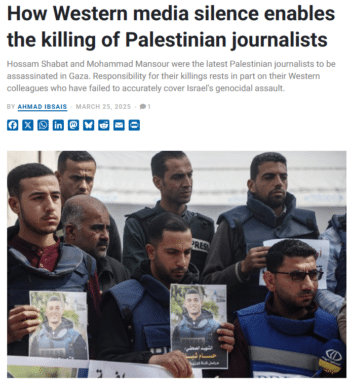
Ahmad Ibsais (Mondoweiss, 3/25/25) on Western journalists: “Their failure to accurately report on the targeting of their colleagues, their reluctance to challenge Israeli narratives, and their tendency to frame these killings as unfortunate byproducts of conflict rather than deliberate acts—these journalistic failures have real consequences.”
Indeed, like so many of his Palestinian media colleagues, Shabat risked his life to speak truth to genocidal power until his final moment. But following his demise, the corporate media in the United States haven’t managed to say much at all—just google “Hossam Shabat” and you’ll see what I mean. His death was covered in leading international outlets like the Guardian (3/25/25), Le Monde (3/25/25) and the Sydney Morning Herald (3/25/25), and independent U.S. outlets like Truthout (3/24/25), Democracy Now! (3/25/25) and Mondoweiss (3/25/25), among others—but virtually no establishment U.S. news organizations.
The otherwise deafening silence has been punctuated by just a couple of corporate media interventions, including a Washington Post report (3/25/25) that made sure to mention in the first paragraph that Israel had accused Shabat of Hamas membership.
Meanwhile, Trey Yingst, a correspondent for Fox News—an outlet by no means known for pro-Palestinian sympathies—has rankled others in right-wing media by having the audacity to observe that Israel had just killed two Palestinian journalists in Gaza and that, of the 124 journalists killed globally in 2024, “around two-thirds of them were Palestinian.” In response to Yingst’s treachery, the Washington Free Beacon (3/24/25) made it clear that the real crime was Fox News’ failure to refer to the dead Palestinian journalists as terrorists.
‘With no one to hear us’
The scant U.S. corporate media attention elicited by the assassination of Shabat regrettably comes as no surprise. After all, it would make little sense for the U.S. establishment to pump Israel full of billions of dollars in weaponry and then complain about the casualties of those weapons. When asked on Monday about the killing of Shabat and Mansour, U.S. State Department spokesperson Tammy Bruce declared that Hamas was to blame for “every single thing that’s happening” in the Gaza Strip.
In a dispatch for FAIR (10/19/23) published less than two weeks after the launch of U.S.-fueled genocide in October 2023, Ari Paul emphasized that “Israel has a long history of targeting Palestinian journalists”—including Palestinian-American ones like 51-year-old Shireen Abu Akleh, murdered in 2022 by Israeli forces in the occupied West Bank—”as well as harassing foreign journalists and human rights activists entering the country.” Such attacks, he concluded,
act as filters through which the truth is diluted.
And dilution has only become turbo-charged since then. By December 2023, CPJ had determined that “more journalists have been killed in the first 10 weeks of the Israel/Gaza war than have ever been killed in a single country over an entire year.” Of the at least 68 journalists and media workers killed between October 7 and December 20, CPJ reported that 61 were Palestinian, four were Israeli and three were Lebanese.
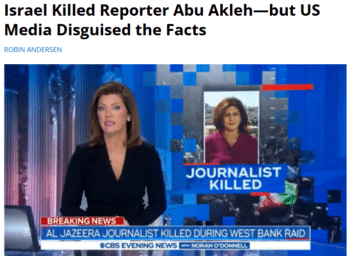
Robin Andersen (FAIR.org, 5/20/22): “Because journalists document the actions of Israeli occupation forces against the Palestinians, they jeopardize the military’s continued ability to act with impunity.”
On November 20 of that year, for example, Palestinian journalist Ayat Khadura was killed in an Israeli airstrike on her home, just weeks after she had shared her “last message to the world,” which included the line:
We had big dreams but our dream now is to be killed in one piece so they know who we are.
On November 7, Mohamed Abu Hassira, a journalist for the Palestinian Wafa news agency, was killed along with no fewer than 42 family members in a strike on his own home. And on December 15, Al Jazeera camera operator Samer Abudaqa was killed in southern Gaza, where he eventually bled to death after Israeli forces prevented ambulances from reaching him for more than five hours. Needless to say, Israeli impunity for all of these crimes remains the name of the game.
Considering all the lethal obstacles Palestinian journalists must contend with to do their jobs—not to mention the psychological toll of having to report genocide day in and day out while essentially serving as moving targets for the Israelis—it seems the least their international media colleagues might do is acknowledge them in death. Alas, mum’s the word.
And on that note, it’s worth recalling some of Shabat’s own words:
All we need is for you not to leave us alone, screaming until our voices go hoarse, with no one to hear us.
Belén Fernández is the author of The Darién Gap:A Reporter’s Journey through the Deadly Crossroads of the Americas and Inside Siglo XXI: Locked Up in Mexico’s Largest Immigration Center, among other titles. She is an opinion columnist at Al Jazeera.

